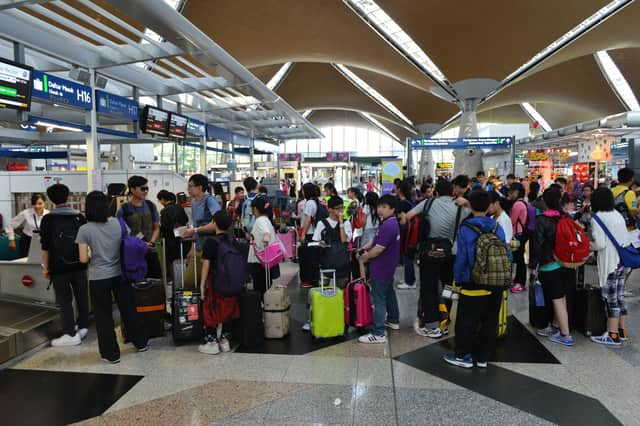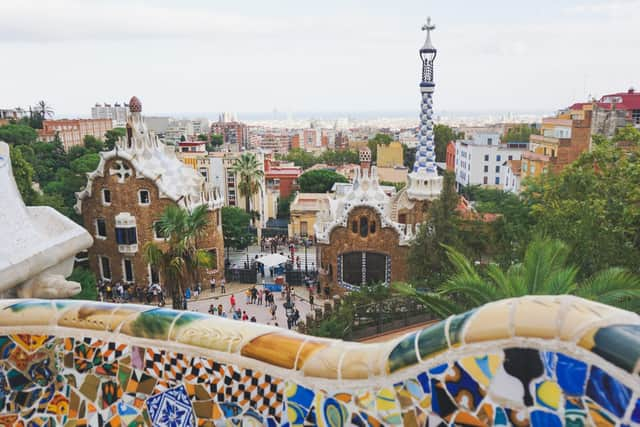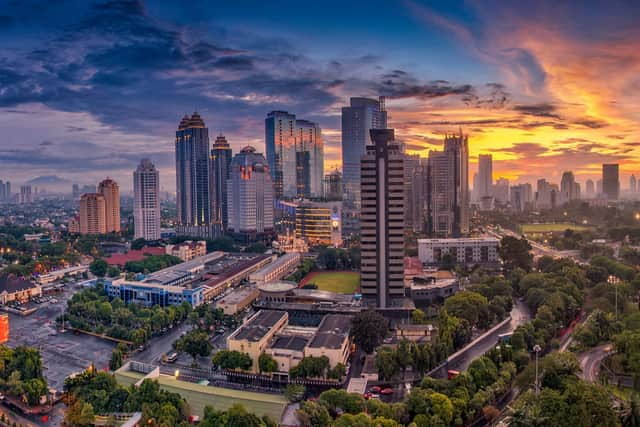This is the most recent travel safety advice for Spain, Gran Canaria, Crete, Cyprus, Italy, and more


With summer fast approaching, most of us are busy getting ready for any upcoming holidays we may have booked.
Meanwhile, the UK Foreign Office has updated its travel advice for a number of countries.
Advertisement
Hide AdAdvertisement
Hide AdIf you have plans to travel to Greece, Cyprus, Spain, Turkey, Indonesia, the US or Tunisia, there are some travel restrictions and advice in place for UK nationals.


With threats of terror in several countries and natural disaster in others, some holiday destinations are considered safer than others.
An outbreak of Listeria has sparked fears among British tourists travelling to Spain.
One woman was killed by the infection and 150 are affected, making it the country's biggest outbreak to date.
Advertisement
Hide AdAdvertisement
Hide AdAnd flooding has hit Ibiza as a result of storms barraging the island, as well as other parts of Spain.


More than 9300 lightning strikes were recorded in Madrid over a six-hour period.
Wildfires were raging in Gran Canaria, starting on Saturday (August 17), with 4,000 people being evacuated as a result.
The fires, advanced on two fronts in a mountainous area of the island.
Advertisement
Hide AdAdvertisement
Hide Ad700 firefighters, including 200 form the military were deployed to tackle the blaze.
There were also wildfires in Portugal, with 1,000 firefighters battling the blaze. 31 people were injured by the fire although the government has not altered its travel advice.
An earthquake of magnitude 5.3 was felt in Crete at 8am local time on July 31. It hit near the island capital of Heraklion.
And this is the second earthquake in Greece in July. Two weeks ago, an earthquake of 5.1 magnitude on 19 July in Magoula, Attica region, and was felt strongly in Athens.
Advertisement
Hide AdAdvertisement
Hide AdLocal authorities are responding. If you’re in the region you should follow the advice of local authorities. Further information is available on the Greek General Secretariat for Civil Protection website.
The earthquake was initially measured at magnitude 5.1 by the Athens Institute of Geodynamics. However, the US Geological Survey gave it a higher initial reading of 5.3.
It hit at 2.13pm local time. Its epicentre was 16 miles northwest of the city.
Earlier this summer in Greece, serious storms in Halkidiki killed six tourists.
Advertisement
Hide AdAdvertisement
Hide AdA Czech couple died when their caravan was blown away, and two Romanians and two Russians were also killed.
A Volcano on the island of Stromboli, just off the coast of Italy and Sicily, erupted on July 3 causing a huge ash cloud to cover the sky.
Many have already been evacuated from the island, and one casualty has been reported. Due to the island’s location and the quick response of the Italian Navy, few injuries have occurred.
However, the plume of ash and added uncertainty of whether further eruptions will occur may have an impact on flights in the region.
Advertisement
Hide AdAdvertisement
Hide AdAnd earlier in July in Cyprus a stray missile landed in a park near capital Nicosia, which is popular with holidaymakers.
The missile, believed to be a Syrian anti-aircraft weapon fired to fend off Israeli airstrikes, landed in Turkish occupied northern Cyprus, setting the mountainside ablaze.
The UK Foreign and Commonwealth Office has guidance for different countries on its website and explained what tourists should do to ensure that they remain safe.
Greece
Localised or severe weather extremes, including wildfires, can affect areas of Greece over the extended summer period. At times, this can cause travel disruption.
Advertisement
Hide AdAdvertisement
Hide AdYou should monitor local and international weather updates from the Greek Meteorological Service or European Meteorological Services website, follow the advice of local authorities at all times and check with your travel provider for travel updates.
The travel advice has not changed as a result of the two earthquakes near Heraklion and Athens.
Italy
There was a volcanic eruption on the island of Stromboli, Sicily, on Wednesday 3 July. Local authorities have responded and are monitoring the situation.
There are no reports of significant impact on populated areas, but local authorities are assisting those on the island who wish to leave. If you’re in the area, you should follow the advice of local authorities.
Advertisement
Hide AdAdvertisement
Hide AdExtreme temperatures are expected across Italy over the last week in June. During a heat wave you should drink water regularly and eat sufficiently. Avoid strenuous activity and drinking alcohol. Keep in touch with friends and family.
Cyprus
More than a million British people travel to Cyprus every year. The government has not updated its travel advice since the missile landed, and has said that it does not plan to.
It says that terrorist attacks cannot be ruled out but most trips to the country go ahead without any trouble.
Sri Lanka
All travel except that which is absolutely essential is advised against in Sri Lanka at the moment due to the terror risks.
Advertisement
Hide AdAdvertisement
Hide AdThis advice does not apply if transiting Colombo airport, providing that passengers remain airside in the airport.
Terrorists are very likely to try to carry out attacks in Sri Lanka. Attacks could be indiscriminate, including in places visited by foreigners.
On 21 April 2019, bombs were used to attack three churches and three hotels in Sri Lanka - in central Colombo, in the northern suburb of Colombo Kochchikade, and in Negombo, roughly 20 miles north of Colomb, as well as in the east of the country in Batticaloa.
According to official figures, more than 250 people were killed, including at least eight British nationals.
Advertisement
Hide AdAdvertisement
Hide AdThere were outbreaks of violence across parts of North Western Province on 13 May, and an island-wide night time curfew was imposed
Security has been stepped up across the island and a State of Emergency remains in place.
Those travelling to Sri Lanka are advised to remain vigilant, keep up to date with developments and follow the advice of local security authorities and hotel security staff. They should also keep in touch with family and friends.
The government also warned that British nationals should keep a low profile, avoid crowded public places, large gatherings (including religious gatherings and places of worship) and any demonstrations.
Advertisement
Hide AdAdvertisement
Hide AdAll of the attacks on 21 April were carried out either in places of worship or in places where foreign visitors were affected. Any further attacks may be targeted against similar locations.
Turkey
Concerning travel to Turkey, the Foreign and Commonwealth Office advise against all travel to areas within 10km of the border with Syria, except the city of Kilis.
British nationals made over 2.3 million visits to Turkey in 2018. Most visits are trouble free.
Tourists should be alert to surroundings and remain vigilant in crowded places popular with foreign nationals, including during festival periods.
Advertisement
Hide AdAdvertisement
Hide AdTerrorists are very likely to try to carry out attacks in Turkey. Terrorist groups, including Kurdish groups, Daesh (formerly referred to as ISIL) and far left organisations, continue to plan and carry out attacks.
British nationals need a visa to travel to Turkey, except for some cruise ship passengers arriving at sea ports for visits of up to 72 hours. If you’re visiting Turkey as a tourist or on business, get an e-Visa online before you travel.
Many parts of Turkey are also subject to earthquakes. You should familiarise yourself with safety procedures in the event of an earthquake and follow the advice of the local authorities.
Egypt
The FCO advise against all travel to the Governorate North Sinai, and all but essential travel to the Governorate of South Sinai (with the exception of the area within the Sharm el Sheikh perimeter barrier) and the area west of the Nile Valley.
Advertisement
Hide AdAdvertisement
Hide AdThis is because of increased criminal activity and terrorist activity in the area.
Terrorists are very likely to try to carry out attacks in Egypt. You should be vigilant at all times and follow the advice of the Egyptian authorities and your travel company, if you have one.
There have been threats to western nationals, institutions and businesses posted on websites and social media. The main threat to foreigners is from extremists linked to Daesh-Sinai.
There is a heightened threat of terrorist attacks targeting Coptic Christians from extremists linked to Daesh-Sinai in Egypt.
Advertisement
Hide AdAdvertisement
Hide AdAround 319,000 British nationals visited Egypt in 2017. Most visits are trouble free.
Spain
Barcelona (Photo: Shutterstock)
Travel advice has not changed as a result of the wildfires or Listeria.
The Listeria cases have mainly been reported in the south of the country, however some people have been hospitalised in Catalonia as well.
As a result of the storms, flights from London and elsewhere in Europe scheduled to land in Madrid-Barajas airport at midnight on August 28 were forced to divert.
Advertisement
Hide AdAdvertisement
Hide AdFirefighters in the region were called out 152 times on while emergency services said they had received more than 1,000 calls.
There have been large gatherings of people in Barcelona and other areas of the Catalonia region in relation to the political developments there.
Further gatherings and demonstrations are likely to take place. They may occur with little or no warning and even demonstrations intended to be peaceful can escalate and turn confrontational. You should exercise caution if you’re in the vicinity. Demonstrations may also cause some disruption and delays to transport services.
Temporary restrictions may apply to car use in Madrid on days when air pollution levels are high.
Advertisement
Hide AdAdvertisement
Hide AdThere have been several deaths as a result of falls from balconies in Spain. Don’t take any unnecessary risks, especially when under the influence of drink or drugs.
Terrorists are likely to try to carry out attacks in Spain.
High temperatures during the extended summer months carry an increased risk of forest fires.
USA
There is currently a high risk of tornadoes, severe storms and flooding across a number of eastern, central and southern states.
Terrorists are very likely to try to carry out attacks in the USA. Attacks could be indiscriminate, including in places visited by foreigners. You should monitor media reports and remain vigilant at all times.
Indonesia
Jakarta (Photo: Shutterstock)
Advertisement
Hide AdAdvertisement
Hide AdTourists are advised against all travel to within four kilometres of the Mount Agung crater in east Bali and within seven kilometres of the Mount Sinabung crater in Kalo Regency, North Sumatra.
These are exclusion zones put in place by the local authorities due to ongoing volcanic activity.
Following the official announcement of the general election results on 21 May there have been demonstrations in central Jakarta, some of which have resulted in violence.
Demonstrations may also take place in other cities on the islands of Java and Sumatra. You should avoid all protests, demonstrations and political rallies as there’s a risk of violence.
Advertisement
Hide AdAdvertisement
Hide AdTerrorists are very likely to try to carry out attacks in Indonesia. Terrorist groups continue to plan attacks and have the capacity and intent to carry out these attacks at anytime and anywhere in the country.
Around 390,000 British nationals visit Indonesia every year. Most visits are trouble free.
Tunisia
There are currently warnings against all travel to:
The Chaambi Mountains National Park and the designated military operations zones of Mount Salloum, Mount Sammamma and Mount Mghila.
The militarised zone south of the towns of El Borma and Dhehiba, within 20km of the rest of the Libya border area north of Dhehiba, and the town of Ben Guerdane and immediate surrounding area.
Only essential travel is permitted to the following areas:
Advertisement
Hide AdAdvertisement
Hide AdAll areas within 75km of the Libyan border, including Remada, El Borma and the town of Zarzis.
The governorate of Kasserine, including the town of Sbeitla, within 10km of the border with Algeria south of Kasserine governorate.
No travel within 30km of the border in El Kef and Jendouba governorates south of the town of Jendouba, including the archaeological site of Chemtou, and areas north and west of the town of Ghardimaou in Jendouba governorate.